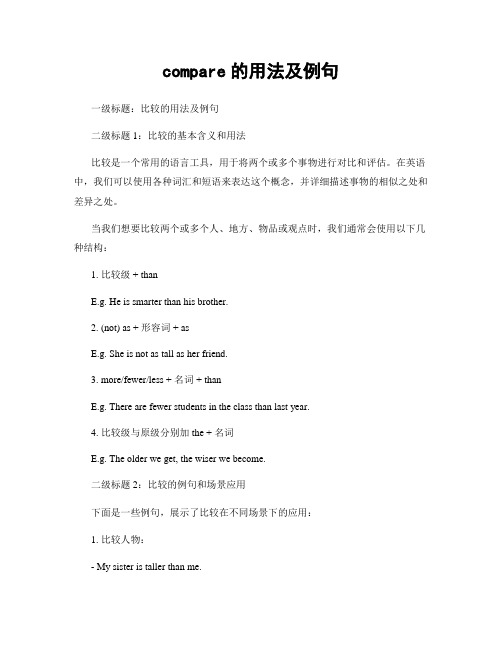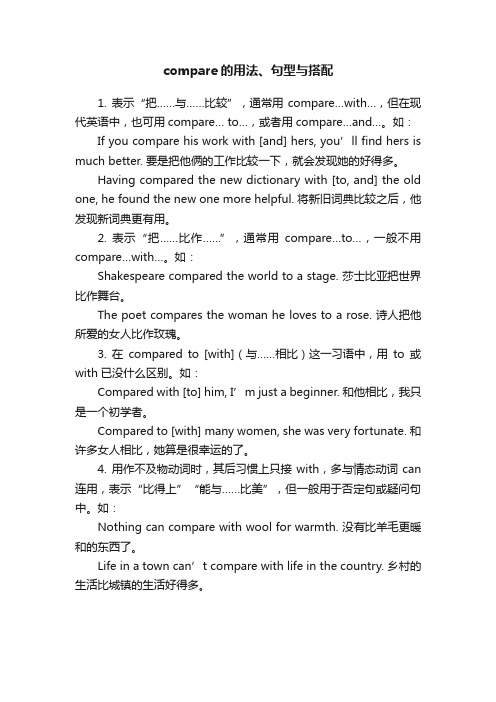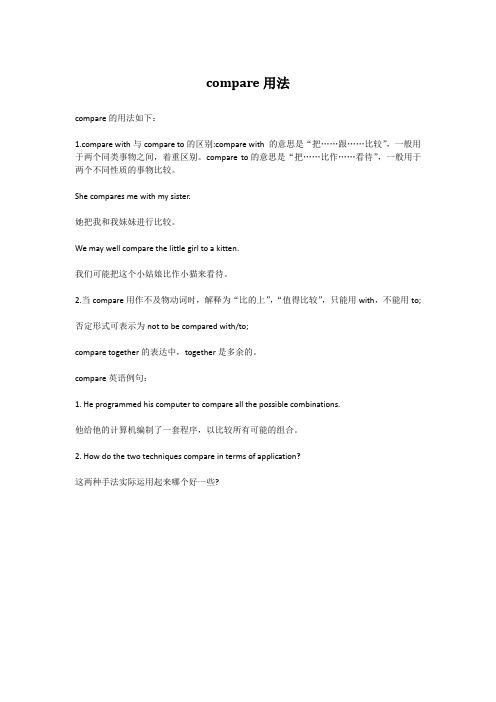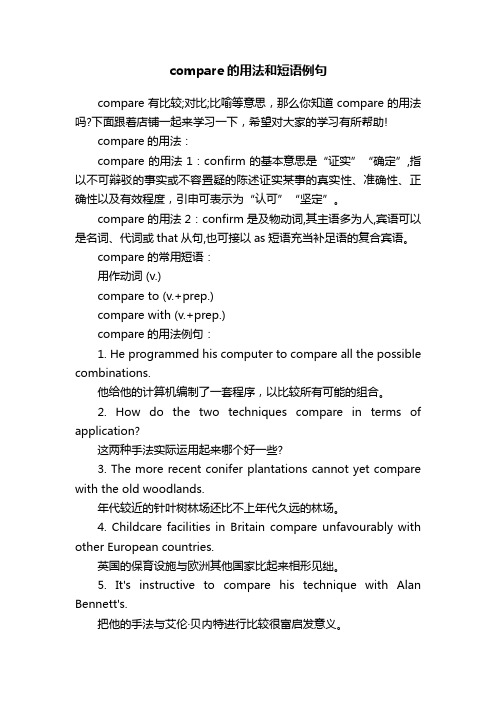compare用法与搭配
compare的用法及例句

compare的用法及例句一级标题:比较的用法及例句二级标题1:比较的基本含义和用法比较是一个常用的语言工具,用于将两个或多个事物进行对比和评估。
在英语中,我们可以使用各种词汇和短语来表达这个概念,并详细描述事物的相似之处和差异之处。
当我们想要比较两个或多个人、地方、物品或观点时,我们通常会使用以下几种结构:1. 比较级 + thanE.g. He is smarter than his brother.2. (not) as + 形容词 + asE.g. She is not as tall as her friend.3. more/fewer/less + 名词 + thanE.g. There are fewer students in the class than last year.4. 比较级与原级分别加the + 名词E.g. The older we get, the wiser we become.二级标题2:比较的例句和场景应用下面是一些例句,展示了比较在不同场景下的应用:1. 比较人物:- My sister is taller than me.- John is funnier than Mark.- She speaks English better than her classmates.2. 比较地点:- New York City is bigger than Boston.- The temperature in Miami is hotter than in Seattle.- Tokyo has a larger population compared to Osaka.3. 比较物品:- The red shirt is more expensive than the blue one.- This car is faster but less fuel-efficient than the hybrid model.- The new smartphone has a better camera than the previous model.4. 比较观点:- Some people believe that money brings happiness, while others think it doesn't.- The benefits of exercising regularly outweigh the drawbacks for most people.- In terms of taste, I prefer homemade food over restaurant meals.5. 比较数量:- We have fewer students in our class this semester compared to last year.- The company had more sales in the second quarter than in the first quarter.- He has less free time now that he has taken on additional responsibilities.比较还可以用来做超过两个事物的对比。
compare的用法、句型与搭配

compare的用法、句型与搭配1. 表示“把……与……比较”,通常用compare…with…,但在现代英语中,也可用compare… to…,或者用compare…and…。
如:If you compare his work with [and] hers, you’ll find hers is much better. 要是把他俩的工作比较一下,就会发现她的好得多。
Having compared the new dictionary with [to, and] the old one, he found the new one more helpful. 将新旧词典比较之后,他发现新词典更有用。
2. 表示“把……比作……”,通常用compare…to…,一般不用compare…with…。
如:Shakespeare compared the world to a stage. 莎士比亚把世界比作舞台。
The poet compares the woman he loves to a rose. 诗人把他所爱的女人比作玫瑰。
3. 在compared to [with](与……相比)这一习语中,用to或with已没什么区别。
如:Compared with [to] him, I’m just a beginner. 和他相比,我只是一个初学者。
Compared to [with] many women, she was very fortunate. 和许多女人相比,她算是很幸运的了。
4. 用作不及物动词时,其后习惯上只接with,多与情态动词can 连用,表示“比得上”“能与……比美”,但一般用于否定句或疑问句中。
如:Nothing can compare with wool for warmth. 没有比羊毛更暖和的东西了。
Life in a town can’t compare with life in the country. 乡村的生活比城镇的生活好得多。
英语comparewith和compareto的区别

英语comparewith和compareto的区别
英语中,compare with 和compare to 是我们经常用到的词组,都有“比较”的意思。
但是它们的用法有所不同,今天我们一起学习一下。
1. compare with:意思是“将……和……比较”,强调同类之间的比较,从而发现不同之处。
例句1:She compared her bag with mine.
她拿自己的书包跟我的作比较。
例句2:How does swine flu compare with avian flu as a pandemic threat?
同是疫病威胁,猪流感与禽流感相比如何?
例句3:No other river on earth can compare with it.
世上没有哪条河能和它相比。
2. compare to:意思是“把……比作……”,主要强调异类相比。
例句4:Books can be compared to friends.
书籍好比朋友。
例句5:The student compares his teacher to his mother.
这个学生把老师比作他的母亲。
例句6:This little boy compares his dog to his best friend.
这个小男孩把他的狗比作最好的朋友。
通过以上的学习,大家可以看出,这两个词组还是有一定的区别的,请在以后的应用中注意区分。
compare用法

compare用法
compare的用法如下:
pare with与compare to的区别:compare with 的意思是“把……跟……比较”,一般用于两个同类事物之间,着重区别。
compare to的意思是“把……比作……看待”,一般用于两个不同性质的事物比较。
She compares me with my sister.
她把我和我妹妹进行比较。
We may well compare the little girl to a kitten.
我们可能把这个小姑娘比作小猫来看待。
2.当compare用作不及物动词时,解释为“比的上”,“值得比较”,只能用with,不能用to;
否定形式可表示为not to be compared with/to;
compare together的表达中,together是多余的。
compare英语例句:
1. He programmed his computer to compare all the possible combinations.
他给他的计算机编制了一套程序,以比较所有可能的组合。
2. How do the two techniques compare in terms of application?
这两种手法实际运用起来哪个好一些?。
compare的用法和短语例句

compare的用法和短语例句compare有比较;对比;比喻等意思,那么你知道compare的用法吗?下面跟着一起来学习一下,希望对大家的学习有所帮助!compare的用法:compare的用法1:confirm的基本意思是“证实”“确定”,指以不可辩驳的事实或不容置疑的陈述证实某事的真实性、准确性、正确性以及有效程度,引申可表示为“认可”“坚定”。
compare的用法2:confirm是及物动词,其主语多为人,宾语可以是名词、代词或that从句,也可接以as短语充当补足语的复合宾语。
compare的常用短语:用作动词(v.)compare to (v.+prep.)compare with (v.+prep.)compare的用法例句:1. He programmed his computer to compare all the possible combinations.他给他的计算机编制了一套程序,以比较所有可能的组合。
2. How do the two techniques compare in terms of application?这两种手法实际运用起来哪个好一些?3. The more recent conifer plantations cannot yet compare with the old woodlands.年代较近的针叶树林场还比不上年代久远的林场。
4. Childcare facilities in Britain compare unfavourably with other European countries.英国的保育设施与欧洲其他国家比起来相形见绌。
5. It's instructive to compare his technique with Alan Bennett's.把他的手法与艾伦;贝内特进行比较很富启发意义。
compare的用法和短语例句

compare的用法和短语例句compare有比较;对比;比喻等意思,那么你知道compare的用法吗?下面跟着店铺一起来学习一下,希望对大家的学习有所帮助!compare的用法:compare的用法1:confirm的基本意思是“证实”“确定”,指以不可辩驳的事实或不容置疑的陈述证实某事的真实性、准确性、正确性以及有效程度,引申可表示为“认可”“坚定”。
compare的用法2:confirm是及物动词,其主语多为人,宾语可以是名词、代词或that从句,也可接以as短语充当补足语的复合宾语。
compare的常用短语:用作动词 (v.)compare to (v.+prep.)compare with (v.+prep.)compare的用法例句:1. He programmed his computer to compare all the possible combinations.他给他的计算机编制了一套程序,以比较所有可能的组合。
2. How do the two techniques compare in terms of application?这两种手法实际运用起来哪个好一些?3. The more recent conifer plantations cannot yet compare with the old woodlands.年代较近的针叶树林场还比不上年代久远的林场。
4. Childcare facilities in Britain compare unfavourably with other European countries.英国的保育设施与欧洲其他国家比起来相形见绌。
5. It's instructive to compare his technique with Alan Bennett's.把他的手法与艾伦·贝内特进行比较很富启发意义。
compare的用法和例句
compare的用法和例句一、了解"compare"的基本用法及其在句子中的不同位置在英语中,动词"compare"用于比较两个或多个事物之间的相似性或差异。
它可以作为及物动词,后接名词、代词或动名词作宾语;也可以是不及物动词,后接介词短语构成状语从句。
1. "Compare"作为及物动词当"compare"作为及物动词时,常与名词、代词或动名词连用,并通过介绍类似性和差异来进行对比。
例句1: I compared the two smartphones before making a decision. (我在做决定之前将这两款智能手机进行了对比。
)例句2:She compared her English skills with her sister's and realized she needed more practice.(她将自己的英语技能与姐姐的进行了比较,并意识到自己需要更多的练习。
)在上述例句中,我们可以观察到"compare + 宾语"的结构。
这种结构可以帮助读者理解作者正在比较两个主体之间的相似点和不同点。
2. "Compare"作为不及物动词当"compare"作为不及物动词时,通常会后接一个以介词开头的短语来表示对比的参照物。
例句3:He compared the prices in different stores and found the best deal. (他对不同商店的价格进行了比较,并找到了最好的交易。
)例句4:We can compare this situation to a sinking ship, with everyone desperately trying to keep afloat.(我们可以将这种情况比作一艘正在下沉的船,每个人都在拼命地想办法保持浮出水面。
compare的用法
compare的用法1. compare 用作vt., 表示“比较”,“对比”,结构为(1). compare A with B 表示“把A和B作比较”,也用为compare A to/and Be.g. We carefully compared the first report with the second.我们仔细比较了第一份报告和第二份报告。
Compared with/to his room, my room is even smaller.Comparing his room (with my room), I find my room is even smaller.注意此句中没有withMy own problems seem insignificant compared with other people’s.与别人的问题相比,我自己的问题算不得什么。
___D___ with the size of the whole earth, the biggest ocean does not seem big at all. (2004湖北卷)A. CompareB. When comparingC. ComparingD. When compared(2). compare A to B “将A比作B”e.g. The old man often compares the young to the sun at 8 or 9 o’clock in the morning.老人常把年轻人比作早晨八九点钟的太阳。
Young people are compared to the sun at eight or nine in the morning年轻人经常被比作早上七八点钟的太阳。
2. compare 用作vi.,表示“与…类似/相似”,结构为compare with/to “比得上”,“可与…相媲美”e.g. This school compares with the best in the country.这所学校可以和全国的最好的学校媲美。
compare to
compare…with; compare…to; compared with/tocompare…with意为“把……与……相比”,侧重指两者间的区别。
如:Compare this car with that one, and you will find the differences betweenthem.把这辆汽车与那辆汽车相比较,你就会发现它们之间的区别。
compare…to…意为“把……比作……”,着重注意两者间的相似点。
如:This song compares our country to a big family.这首歌把我们的国家比作一个大家庭。
compare既可以单独用作及物动词,也可用作不及物动词。
用作不及物动词时,以compare with…形式出现,表示“与……相比”。
如:Living here can’t compare with living in Shanghai.在这儿生活不能和在上海(生活)相比。
If you compare the two words,you can tell the difference between them.如果你比较这两个单词,你就会辨别出它们之间的不同。
compared with…和compared to…都可用作状语,意义基本相同,可互换。
如:Compared to/with him,you are lucky.与他相比,你是幸运的。
It was a small town then,compared to/with what it is now.和现在比起来,那时它还是个小镇。
英语词语辨析(一):Compare to/Compare with很多场合,Compare to 和 Compare with 是可以互换的。
如果要详细区分它们,可以注意以下两点:(1) Compare to 强调被比较的人/物/概念中的相似处。
例句-1:The critics compared his work to that of Martin Amis.批评家把他的作品与 Martin Amis的作品相提并论。
compare放在句首的例句
compare放在句首的例句
如果我们说把他和他朋友比的话,应该说we compare him with his friends。
him是compare的宾语。
例:knowing that he is tired, i dont speak to him。
人称I 和动词know之间的关系是I know he istired,主谓关系,所以是ing形式。
扩展资料
Also, do your best not to compare yourself to others.
同时,尽量不要拿自己和别人比较。
Many bees go out, but none tries to compare all sites.
许多蜜蜂都会外出,但没有一只会去比较所有的地点。
Can you compare different kinds of advertising methods?
你能比较一下不同的广告方法吗?
I'm just not sure we can compare it with the industrial age.
我只是不确定能否将其与工业时期相比。
向你推荐的相关文章
相关文章列表
微信扫码分享。
- 1、下载文档前请自行甄别文档内容的完整性,平台不提供额外的编辑、内容补充、找答案等附加服务。
- 2、"仅部分预览"的文档,不可在线预览部分如存在完整性等问题,可反馈申请退款(可完整预览的文档不适用该条件!)。
- 3、如文档侵犯您的权益,请联系客服反馈,我们会尽快为您处理(人工客服工作时间:9:00-18:30)。
compare用法与搭配
1. 表示“把……与……比较”,通常用compare…with…,但在现代英语中,也可用compare… to…,或者用compare…and…。
如:
If you compare his work with [and] hers, you’ll find hers is much better. 要是把他俩的工作比较一下,就会发现她的好得多。
Having compared the new dictionary with [to, an d] the old one, he found the new one more helpful.
将新旧词典比较之后,他发现新词典更有用。
2. 表示“把……比作……”,通常用compare…to…,
一般不用compare…with…。
如:
Shakespeare compared the world to a stage. 莎士
比亚把世界比作舞台。
The poet compares the woman he loves to a rose.
诗人把他所爱的女人比作玫瑰。
3. 在compared to [with](与……相比)这一习语中,用to或with已没什么区别。
如:
Compared with [to] him, I’m just a beginner. 和他相比,我只是一个初学者。
Compared to [with] many women, she was very for tunate. 和许多女人相比,她算是很幸运的了。
4. 用作不及物动词时,其后习惯上接with(也有时接t o),多与情态动词can连用,表示“比得上”“能与……比美”,但一般用于否定句或疑问句中。
如:
Nothing can compare with wool for warmth. 没有
比羊毛更暖和的东西了。
Life in a town can’t compare with life in the c ountry. 乡村的生活比城镇的生活好得多。
